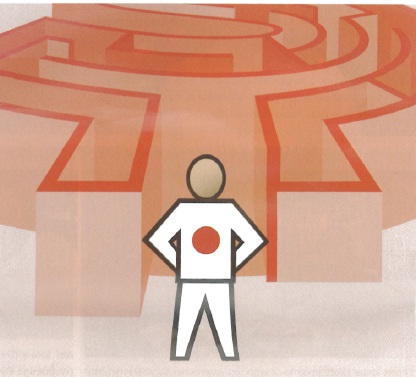Politics and brain surgery made easy
by Robert J. Collins
“Hey you SOB,” (love it when people call me that — Sweet Old Bob) “how do you cook a rabbit?”
How to cook a rabbit is merely one of the many questions asked by those seated at my knee. “Where are the holes in your jeans?” is another. And “How is the Doppler Effect factored into sub-orbital calculations of planetary three-dimensional positioning schemes on both a static as well as dynamic basis?” Slam dunk — people ask that all the time.
But the most frequent question by far and away is: “JAPANESE POLITICS??!!?? YA GOTTA BE KIDDING, RIGHT??!!??”
Well, first of all, we must disabuse ourselves of any stray notion or random thought that Japanese politics is about getting elected to a specific office or position. (“Manage the Getting-Rid-Of-The-Post-Office Ministry at this point in time, especially when all hell’s breaking out on the subject as we, so to speak, speak? Not on your life, Jack-san”)
And terms, such as specific periods of time, don’t exist. The next election could take place anytime between this Thursday and doomsday. For that reason doctors, lawyers, and university professors seldom run for public office. When could they return to the real world?
Even the ‘water world’ is underrepresented in politics, although it is rumored that a former and remarkably active mama-san from Kansai is in the Diet. (Or maybe she’s ON a diet. I’m being deliberately vague about this. The legal department warns that a libel suit might put the Weekender trillion-yen working capital at risk.)
No, boys and girls, we must recognize Japanese Politics for what it is — a full-time, permanent career choice for the thousands who don’t want to get real jobs and who don’t mind being photographed sitting around in astonishingly ugly armchairs with 1890s era antimacassars on the backs. And it goes on in many families for generations. Oh boy. What a deal.
We’re talking about one seemingly endless parade of serious dudes and dolls walking along crowded hallways from meeting to meeting, forming alliances, shifting between the home team and visitors, and in general just keeping their faces hanging out for all to see. It makes no difference, to them or us, what the project of the day is or where they fit with the issues. One may be an outsider on a project for while, but as things swing around one becomes an insider — all without formulating the tiniest thought ‘apropos’ the project, or even clearly understanding what it’s all about.
Okay, there is some real work involved. White gloves must be found and worn during the random and sporadic campaign adventures. (White bandages are put on hands to keep the hoi polloi from pressing too much flesh.) Speeches must all be (a) loud and (b) aggressive. And running around neighborhoods touching and smiling at complete strangers must be made to look like the most exciting activity ever conceived — better than sex (speaking of conception).
The classic reaction of constituencies in the States and in Japan regarding the work of politicians is interesting. Showing photographs of elected officials sitting in deliberative bodies in Congress and at the Diet brought the following comments:
American: “There’s my Congressman. He’s sound asleep. He won’t be able to support the bill I’m interested in. I’ll throw him out next election.”
Japanese: “There’s my Diet Member. He’s sound asleep. He CAN’T support the bill I’m interested in anyway. Besides, the poor man is tired and must be working too hard.”
“In the diencephalon, the thalamus, pinea and pituitary glands interact with the choroid plexus, so why can the aortic blood supply be shunted BEFORE pressure has been established in venous reservoir Orans?”
“Well, remember, we are not exactly shunting the blood supply. We are merely cross-tying Pymm’s entry-flow access to respond with the pulsic…”
Wait. That’s the next column. Brain surgery. Much easier than understanding Japanese Politics.
The Proof is in the Numbers
The ruling Liberal Democratic Party faced its biggest challenge to date when Prime Minister Koizumi forced an early election after lawmakers of his own party rejected the bill to privatize the post office. Elections! The disbandment of the LDP! Reform! The slogan for the LDP was “Don’t stop progress!” and the Prime Minister led his party’s election campaign under the do-or-die banner of reformation or bust. And after the dust settled, the LDP was victorious. By a landslide. And in the end, the numbers speak louder than words:
37 — Number of LDP party members Prime Minister Koizumi kicked out after they opposed the bill to privatize the post office. The Prime Minister then proceeded to dispatch ‘assassins’ to run against them in the elections, with favorable results.
50 — Approximate years the Liberal Democratic Party has run Japan.
296 — Number of seats out of 480 the LDP now has in the lower house.
63 — Number of seats the Democratic Party of Japan lost in the lower house.
1 — Number of seats the Democratic Party of Japan won in Tokyo, a previous stronghold.
¥3 trillion — How much the Post Office is worth in assets, making it the biggest financial institution in the world.
2017 — Year postal privatization should be completed.









